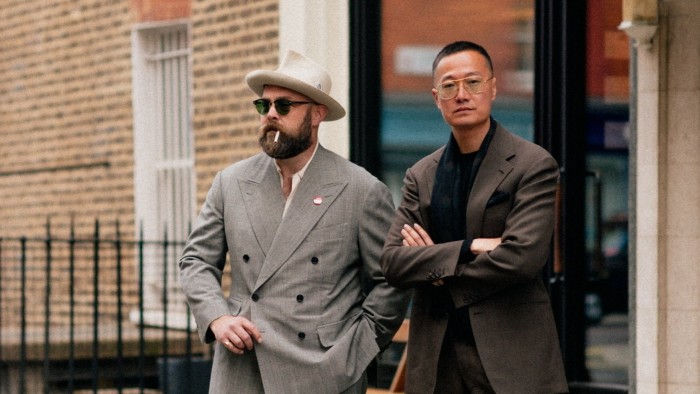Unlock the Editor’s Digest for free
Roula Khalaf, Editor of the FT, selects her favourite stories in this weekly newsletter.
The writer is the City editor at FT Alphaville
About once a month someone sends me a photo of a shopfront, a boutique in London’s Marylebone called Bryceland’s, to ask whether I’ve branched out to menswear. It’s a joke that works on two levels. First, its name is my name. Second, its style is not my style. Bryceland’s sells clothes inspired by Hollywood’s golden age, whereas I look like I got dressed in the dark in a selection from an Oxfam store room during a fire alarm.
It wasn’t always this way. Growing up in the north-east of Scotland, self-worth came from wearing the right clothes. The measure of success was disposable income, so labels advertised you were doing OK. My first part-time job bought a T-shirt that everyone could tell was expensive because it said Giorgio Armani across the front in big letters.
Then came London, and big-city anonymity, so I let things slide. Next came parenthood, debt, work-from-home and the inexorable effects of gravity, and I let things slide some more.
I ask Albert Elliot, Bryceland’s assistant manager and fitter, about my choice of outfit while he’s sizing me up. “What’s important is that you’re comfortable,” he says. We both know it’s diplomacy, a point he underlines by choosing a suit jacket that, as soon as it’s on my shoulders, makes me question whether I’ve ever been truly comfortable in anything I’ve picked out myself.
“That’s hanging well,” says Albert, subtly nudging the top button to cover one of the coffee stains on my T-shirt. “Maybe just taken out a little across here.”
I look in the mirror and wince. The jacket matches its price tag (about £1,800, depending on fabric). So do my trousers (£10.95). What’s jarring is the contrast. My top half no longer matches my bottom half. Jeans I considered passable now look like they were bought from a supermarket, which they were. I look like a game of Exquisite Corpse.
Bryceland’s represents the kind of shop I’d written off as not for my type. London has much more expensive ways to buy a suit (on Savile Row it’s easy to spend eight times as much) but cost alone wasn’t what intimidated me. It was seriousness applied to something as silly as fashion. There might be a doorbell, or shirts in display cases, or a sales assistant whose stare categorises me immediately as time-waster or shoplifter. It takes the confidence born of means to navigate such a place.
And, disappointingly for the purposes of this article, there is nothing so daunting. Instead, I get a handshake and an offer of tea with co-owner Kenji Cheung, who’s in a backroom strewn artfully with old shipping crates, knick-knacks and orders tagged for collection.
Hailing from Hong Kong, Cheung is a dental-products entrepreneur whose enthusiasm for vintage brought him into the orbit of Australian-born designer Ethan Newton, formerly of Ralph Lauren. The pair opened their first shop in Tokyo in 2015, finding success in a crowded market by making preppy and Italian-American styles from mostly British fabrics. The London branch, trading since 2023, stocks the same kind of western craftwork that has been valued more in Asia than at home.

Cheung talks of his admiration for everyman brands that survived the Great Depression, such as coffee business JJ Bean, and for Hong Kong’s conservatorship of tailoring traditions. He talks about Navajo jewellery, sheepskin bomber jackets, Japanese denim and English tweed. He talks about the small Norfolk factory that makes their embroidered slippers that would have suited the late Hugh Hefner. It’s dizzyingly eclectic but, because everything is an expression of the owners’ particular tastes, it makes sense together. That’s the point.
Writing this column has helped me understand how much wealth done right is about outsourcing, not accumulating. Anyone with money can buy a fast car, a complicated watch or a T-shirt that says Armani across the front. More valuable is to rent other people’s time. Whether chartering a yacht or buying a suit, the smart way to operate is to seek out people whose tastes match yours, then reward them for doing the hard work of helping you live better.
The obvious thing to say about clothes relates to how cost, quality and longevity tend to correlate. Equally important is the personal guarantee. Money well spent can buy security that the staff won’t let you leave looking like a dork. It’s delegation, basically. Wealth means employing help, even though most times they won’t identify as such, and anyone who accumulates while over-ruling the available advice is burning money.
So will my next suit cost more than my monthly mortgage payment? Unfortunately, no. As much as made-to-measure makes long-term sense, the upfront cost remains hard to rationalise. I’ll keep dressing chaotically, and expect to keep receiving the shopfront photo monthly. I intend to reply that Bryceland’s style may not be my style, but given the means, it would be.
